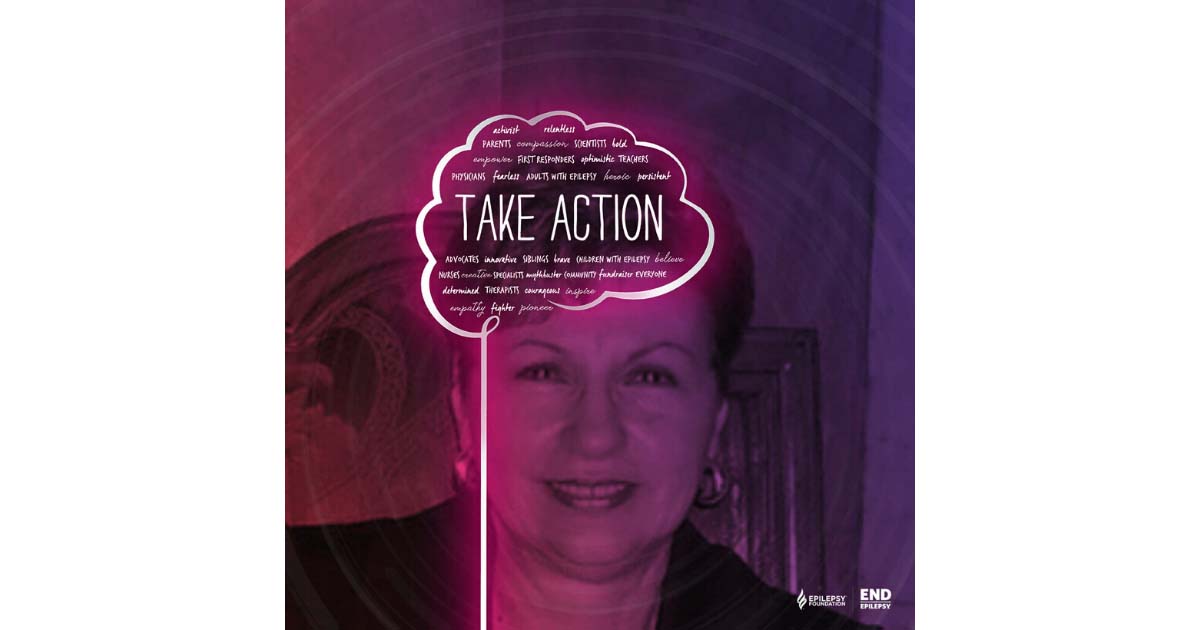Meet Lifetime Accelerator Awardee Mary Ann Brodie

Epilepsy News From: Tuesday, March 17, 2020
The Lifetime Accelerator Award was established in 2012 to honor physicians, scientists, industry leaders, and others who have demonstrated a lifelong commitment to bringing new therapies to people living with epilepsy. Recipients are chosen by an independent committee of global thought leaders and clinical investigators in epilepsy and seizure therapy discovery and development.
This year’s awardee is Mary Ann Brodie who has devoted more than 30 years of her life towards advancing clinical trials in epilepsy. Mary Ann received her award in March 2020. We sat down with Mary Ann to learn a little bit more about her career and her perspective on epilepsy.
How did you get involved with the epilepsy field?
In the 1980s, I interviewed to work with Dr. Marc Dichter at the University of Pennsylvania, Graduate Hospital Epilepsy Center as an administrator and later as a clinical coordinator. Knowing nothing about neurology at the time, accepting that job was one of the best decisions I have ever made.
What did you do at the center?
My initial role was to organize and oversee the daily administrative activities of the Penn Epilepsy Center. Two years later, in addition to managing the Center, I took on the role of study coordinator working with Dr. Jacqueline French. In addition, to the clinical trials, we organized preceptorships (a supervised clinical experience like an apprenticeship) and educational activities for industry, investigators and coordinators.
In 1992, we launched our first Antiepileptic Drug Trials Symposium which began as a workshop for coordinators and investigators to learn how to conduct clinical trials. This meeting has continued bi-annually for the last 28 years and now focuses on issues related to antiepileptic drug and device development. This is attended by representatives from academia, industry, the National Institutes of Health, and FDA to review what has been learned and to discuss strategies for future AEDD development.
What would be the most important piece of advice that you would give to other clinical coordinators?
Always keep an open dialogue with your investigator and ask for guidance if there are any uncertainties. Clinical trials have inclusion and exclusion criteria that are critical to ensure that you are enrolling the right people for the right study. As a clinical coordinator, you should know the ins and outs of what those criteria are and whether your patients qualify.
What was the first thing that struck you about epilepsy?
What struck me was the depth with which seizures can impact people’s lives. One of the first participants with epilepsy who participated in one of our trials was a young gentleman who worked in the court system as a stenographer. Because of his seizures, he was unable to continue to work. It was devastating to think that someone so young had to give up his career.
Then there were the adult children of elderly parents who had intractable seizures. Hearing the parents talk and worry about who would care for them long term was distressing. These are only some of the dynamics that pushed us to continue to look for help for these people.
What is the Epilepsy Study Consortium?
The Epilepsy Study Consortium is a group of scientific investigators from academic medical research centers who are dedicated to accelerating the development of new therapies in epilepsy to improve the care of people with epilepsy. The organization’s goals include building a partnership between academics, industry and regulatory agencies and optimizing clinical trial methodology in order to responsibly speed new treatments to people with epilepsy.
How did the Epilepsy Study Consortium start and how did it evolve over time?
In 2007, as the requests for consulting on clinical trials and drug development increased, Dr. Jacqueline French asked if I would join her in establishing the Epilepsy Study Consortium. This became a team effort including Bree DiVentura, a clinical coordinator also at the Penn Epilepsy Center.
In addition to consulting we also focused on educational components for industry. We would set up classes to have industry learn the epilepsy basics and advisory boards to help them develop their drug. We wanted to ensure that those designing clinical trials had the opportunity to meet people with epilepsy, learn from their experiences with epilepsy, and understand the realities that people with epilepsy face.
We then began to provide assistance in writing protocols and establishing source documentation to standardize trials. After recognizing the necessity to have the appropriate participants enrolled in trials, we developed site training tools and conducted review of seizure classification and diagnosis. As a team effort, the consortium has dramatically grown throughout the years and we are constantly adding tools and support.
In your perspective, what is the biggest roadblock for moving epilepsy clinical trials forward?
Recruitment is the biggest roadblock. The good news is that there are now a lot more options for individuals to try before considering a trial. But it also means that it is now harder to get the right people into a critical clinical trial to test a new therapy.
The problems with recruitment result in more clinical study sites getting involved to ensure that the numbers are met. The more sites complicate the logistics of data coordination and ethical approvals, leading to slower clinical trial starts and increases the overall cost of launching and completing a trial.
How has the epilepsy pipeline changed in the past 5 years?
For a while, it seemed like all the companies were leaving epilepsy – especially due to financial constraints and recruitment issues. And although these issues remain, the tide seems to be shifting.
This past year alone, we worked with 43 companies on epilepsy trials and within this past year, four new therapies have gotten FDA approval for epilepsy indications: Cenobamate, Deep Brain Stimulation, Nayzilam® (midazolam), and Valtoco® (diazepam nasal spray). It’s an exciting time for the epilepsy field.
Authored by
Sonya Dumanis PhD
Reviewed by
Epilepsy Foundation Research
Reviewed Date
Tuesday, March 17, 2020
